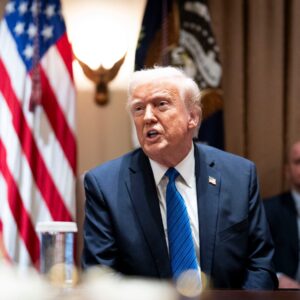Trump news

In a series of bold actions, President Donald Trump has recently implemented policies that have significantly altered the political and economic landscape, both domestically and internationally. These moves have sparked widespread debate and have the potential to reshape various facets of governance, trade, and international relations.
Executive Order Ends Collective Bargaining in National Security Agencies
One of the most impactful decisions made by President Trump is the signing of an executive order that terminates collective bargaining rights for federal labor unions within agencies involved in national security. This order affects departments such as State, Defense, and Veterans Affairs, while explicitly excluding police and firefighters. The administration justifies this action by citing the authority granted under the Civil Service Reform Act of 1978, aiming to enhance efficiency and streamline operations within these critical agencies. However, this move has faced strong opposition from labor unions, including the American Federation of Government Employees, which plans to pursue legal action, and the AFL-CIO, which condemns the order as retaliatory.
Targeting of Elite Law Firms
In a move that has sent shockwaves through the legal community, President Trump issued an executive order directing government agencies to sever ties with the law firm WilmerHale. The order mandates the termination of contracts, suspension of security clearances, and restriction of the firm’s staff access to federal buildings. WilmerHale’s association with Robert Mueller, who led the investigation into alleged Russian interference in the 2016 election, has been a point of contention for the administration. Trump accuses the firm of undermining justice and U.S. interests, labeling Mueller’s investigation as politicized and a “witch-hunt.” WilmerHale has responded by deeming the order unlawful and expressing intent to seek legal remedies. This action is part of a broader effort by the administration to confront perceived adversaries within the legal sector, following similar measures against firms like Paul Weiss, Perkins Coie, and Covington Burling.
Imposition of 25% Tariff on Car Imports
President Trump’s announcement of a 25% tariff on imported automobiles has had immediate and significant repercussions on global markets. European automakers, including BMW and Volkswagen, experienced notable share declines, reflecting investor concerns over the escalating trade tensions. U.S. manufacturers like General Motors also faced sharp stock decreases. The UK government, through Chancellor Rachel Reeves, has expressed a desire to avoid retaliatory measures, instead seeking improved trade relations with the U.S. This development underscores the complexities and potential economic challenges arising from the administration’s protectionist trade policies.
Warning of Large-Scale Tariffs on the European Union
Further intensifying trade disputes, President Trump has warned of imposing large-scale tariffs on the European Union and Canada if they collaborate to economically harm the United States. This follows his decision to implement a 25% tariff on all automobiles exported to the U.S., effective April 2. The European Automobile Manufacturers Association has voiced alarm over the potential negative impact on both global manufacturers and the U.S. manufacturing sector, including companies like Tesla. European leaders have expressed concern and are advocating for a firm yet negotiated response to avert a full-scale trade war.
Withdrawal of Elise Stefanik’s UN Ambassador Nomination
In domestic political maneuvers, President Trump has withdrawn the nomination of Representative Elise Stefanik for U.S. ambassador to the United Nations. The decision is attributed to concerns over maintaining the slim Republican majority in the House of Representatives. The administration emphasizes the necessity of retaining every Republican seat in Congress to advance its legislative agenda. This move highlights the strategic calculations within the party to preserve influence and control in a closely divided legislature.
Market Reactions in the Gulf Region
Despite initial setbacks following the U.S. announcement of auto import tariffs, most Gulf stock markets have shown resilience and rebounded. The Saudi benchmark index, for instance, rose by 0.5%, driven by gains in companies like Saudi Arabian Mining Company and Saudi Aramco. This recovery indicates a complex interplay between global trade policies and regional market dynamics, as investors navigate the uncertainties introduced by the administration’s recent actions.
Broader Implications of Trump’s Actions
President Trump’s recent initiatives reflect a broader strategy aimed at redefining U.S. domestic and foreign policy. By challenging established norms and taking assertive stances on trade and labor relations, the administration seeks to prioritize national interests and assert U.S. dominance on the global stage. However, these actions carry significant risks, including the potential for retaliatory measures from international partners, legal challenges, and domestic political fallout. The administration’s approach underscores a willingness to disrupt traditional alliances and economic practices in pursuit of its policy objectives.
Domestic Policy Shifts and Economic Nationalism
Central to President Trump’s agenda is a shift towards economic nationalism, characterized by protective tariffs and a focus on domestic manufacturing. The imposition of tariffs on imports, particularly in the automotive sector, aims to incentivize companies to produce goods within the United States. While this approach is intended to bolster domestic industries and create jobs, critics argue that it may lead to increased consumer prices and strained international relations. The administration maintains that these measures are necessary to correct trade imbalances and protect national security interests.
International Relations and Trade Dynamics
The administration’s recent actions have significant implications for international relations and global trade dynamics. By adopting a more confrontational stance, the U.S. risks alienating key allies and trading partners. The potential for a trade war looms large, with countries considering retaliatory tariffs and other measures. These developments could disrupt global supply chains, impact international markets, and alter the balance of economic power.
